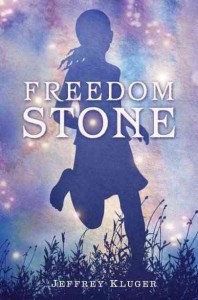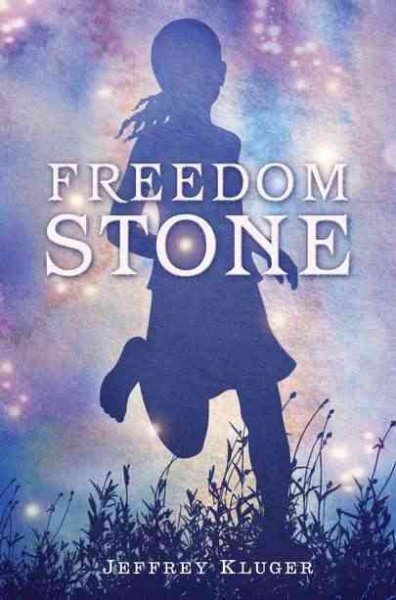 Jeffrey Kluger’s Freedom Stone is a rare gem of a book. He takes the reader on a magical journey to a beautifully realized time and place and leaves the reader feeling connected with the characters long after the last word is read.
Jeffrey Kluger’s Freedom Stone is a rare gem of a book. He takes the reader on a magical journey to a beautifully realized time and place and leaves the reader feeling connected with the characters long after the last word is read.
Lillie has lived her whole life on the Greenfog plantation in South Carolina with her parents and younger brother, Plato. With the War not going well for the Confederate Army, slave volunteers are being accepted to fight with the promise of freedom for themselves and their families. Lillie’s father joined up, but months ago he was killed in action and with Union gold found in his pockets, he was labeled a thief and forfeited the promised freedom for his family. Things take a sharp turn for the worse as their Master’s fortune is failing and selling off Plato to the slave traders would fetch the Master a handsome profit. Lillie quickly realizes that she must do something to prove her father wasn’t a thief, win their freedom, and save her brother. With the help of Bett, an old slave who bakes magical bread, Lillie discovers a strength and courage inside herself that will change her destiny.
Lillie provides a touchstone for the narrative in Freedom Stone, but the spell of this story is complexly woven by the other characters’ perspectives Kluger shares in varying chapters: Bett, the wise old slave who weaves the ancient magic central to the action; Miss Sarabeth, the Master’s daughter who used to play with Lillie and now feels herself coming into her birthright and plagued by suspicious about her former “friend”; Cal, the headstrong young slave whose foolishness, bravery, and willful nature make him a target of the plantation’s overseer; Minervy, the mousey slave who minds the slave babies with Lillie; and Lillie’s younger brother Plato, still too young to really understand the horrors of slavery, but about to be lost to them forever.
Kluger demonstrates skill in the way he develops the characters and the situations in Freedom Stone; he’s dealing with one of the most troubling topics in American history and he walks a fine line in presenting the inhumane, cruel, menacing side of this time in our past while also portraying the humanity, dignity and genuineness of the people themselves. Writing historical fiction well means being able to represent accurately the place, customs, mindset, and time period while also being able to draw characters whose experiences, outlook and worldview fits into that place and time and ultimately making the moder- day reader care about and connect to the characters, the story, and the time. In Freedom Stone, Kluger succeeds on multiple counts: there’s both the menacing and sickening side of the time, but also finely drawn characters who elicit our compassion, encourage us with their courage and conviction, and help the reader connect more immediately and intimately with the world and time of the novel.
- Posted by Cori


1 Comment